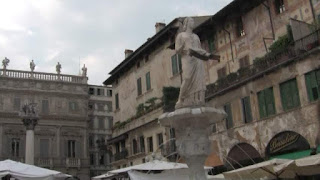Il
trovatore (The Troubadour) is an opera in four acts by the famous Italian
composer Giuseppe Verdi. Themes of obsession, revenge, war, love and family are
conveyed through characters who present dramatic images. It was based on the
play El trovador (1836) by Antonio García Gutiérrez, a youth of seventeen. This
youth took the play to a theatre, where it was at once put in rehearsal. Fortunately, the play El trovador obtained a
phenomenal success.
The opera
was also a triumph from the first night, a success due to Verdi's work over the
three years. The premiere took place at the Teatro Apollo in Rome on 19 January
1853. The eagerness of the Roman public to hear it was extraordinary. On the
eve of the premiere, the Tiber river had risen in flood and invaded the whole
district near the theatre. But in spite of everything - the cold, the mud, and
discomfort - from nine o’clock in the
morning the doors of the Apollo were beseiged by a great crowd, who, with their
feet in water up to the ankles, squeezed, pushed, and disputed in order to get
places for the evening. It evoked
frenzied excitement. Its success spread
fast, not only in Italy but through the whole of Europe. Theatre after theatre
produced it, answering the clamour of eager subscribers and patrons. At Naples
three houses were giving it at the same time. Seldom was an opera more
fortunate.
Now Il trovatore is one of the famous operas frequently performed
at the Arena di Verona, which each summer hosts the Verona Opera Festival.
Its great acoustics and architecture make the Arena di Verona the ideal stage
for large scale operas such as this. There is definitely something magical in
listening to the arias soaring up to the sky from the stage with a
spectacularly lavish stage set.
The plot
of Il Trovatore begins in the acts of a gypsy mother burned for suspected
witchcraft, and avenged by her daughter, Azucena, when she throws the child of
her executioner into the fire. Possessed by a dark force in that moment, the
child she threw into the flame was her own. Azucena sees the event repeating in
every waking moment, in the flicker of the fire, and in the shape of shadows.
But only she knows the truth. She raises the child as her own child, calling
him Manrico. Constantly haunted by her mother’s dying words ‘mi vendica’
(avenge me), Azucena sets in motion a series of events which lead to Manrico’s
death.
The child’s father seeks vengeance for the act
and forces his surviving son, the Count di Luna, to devote his life to avenging
his brother’s death. The unknowing brothers Manrico and di Luna become rivals
for the love of Leonora, the Princess. But Leonora has fallen in love with a
mysterious troubadour, which is Manrico, who sings of his love at her window,
and so rejects the advances of Count di Luna.
Manrico
and di Luna are destined to oppose each other, first as leaders of opposing
factions in the war, and now in the pursuit of Leonora’s heart. Not until the final blow is struck and Manrico
dies at di Luna’s order does Azucena reveal that his rival was his brother, and
to cry out that her mother has finally been avenged.
THE END







